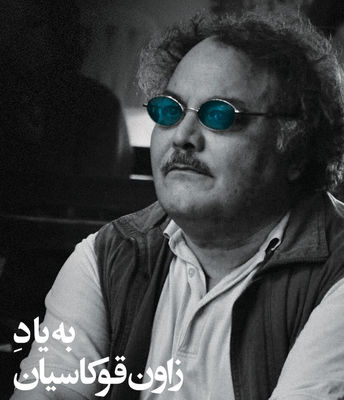The audience watched the program which streamed online at TVA, the Iranian video sharing and film streaming website.
The program named “A Night with Zaven” began with a video clip about the filmmaker followed by speeches delivered by his friends and students.
Author Heshmatollah Entekhabi talked about Zaven and his influence on the art of Isfahan and said, “The atmosphere of Isfahan is sad without Zaven. He was an inseparable part of the art of Isfahan.”
Entkhebai, the managing director of Mana Publications, said that a special report was published in honor of Zaven, which he took to him and he liked it very much.
“I think the best bulletins of Isfahan were published while Zaven was alive. He established the love of cinema in the hearts of the children of Isfahan” Entekhabi said.
Next, the young filmmaker Majid Sheida, one of Zaven’s former students who has compiled the book “A Season with Zaven”, said, “The story of the book dates back to 2009 when I met him at the Isfahan Artists Forum during an interview, and I thought why hasn’t anybody written a book about Zaven, who himself has carried out many research works and written many books. I asked him for an interview and he accepted, and I began with his love and interest in cinema.”
Isfahan Mayor Qodratollah Noruzi called Qukasian a popular artist who was well-known among the people of Isfahan.
Qukasian passed away at the age of 64 in 2015 following a battle with stomach cancer.
He was the author of a large number of books and biographies of prominent Iranian filmmakers and stars, including Bahram Beizai, Masud Kimiai, Abbas Kiarostami, Bahman Farmanara, Khosro Sinai, Golab Adineh, Reza Arham-Sadr and Fatemeh Motamed-Arya.
He made his debut feature “All My Children” in 1984. He had previously directed the short films “Ancient Bride” and “Another Season”, and the documentaries “Jolfa, My Museum” and “The Picture of Imagination”.
Earlier in May 2009, Qukasian was honored during the second edition of Iran’s Cinema Book of the Year ceremony held at the Iranian House of Cinema.
The honoring ceremony was followed by a screening of a short film on Qukasian in which cinematic figures Khosro Sinai, Kianush Ayyari, Minu Farshchi and Jamshid Arjmand talked about Qukasian.
In his short speech during the ceremony, Farmanara said, “I have been friends with Qukasian for years. We are both from Isfahan and whenever I get a chance to travel there, I would be sure to meet him. Actually, it is hard to befriend a critic, especially when you are a filmmaker, and he is a critic. But he is the kindest critic I know. He might be kind, however, he informs us of his views too, but he doesn’t tear the filmmaker apart with his criticism. He never left Isfahan and tried to develop cinema in the city, and actually brought cinema experts to Isfahan.”
Farmanara had later pointed to the active presence of the Armenian-Christian community residing in Iran and continued, “Iran’s cinema is indebted to the Armenian community [in Iran]. They have made great progress in the technical aspect of cinema. For example, Samuel Khachikian and Varuj Karim-Masihi are two examples of veteran Armenian filmmakers.”
Qukasian had also made a short speech and stated, “Newton has said in one of his statements, ‘If I have seen further it is by standing on the shoulders of giants who have come before me.’ And all these years, I tried to put myself on the shoulders of the dear and splendid giants around me to see a few steps more in front of me. Their breath gives me life and hope.”
“We must understand first to learn more. I made great efforts to understand myself and others, to understand the films, filmmakers and the critics in the country and overseas. In order to see a few steps further, I spoke a lot with filmmakers Masud Kimiai, Bahram Beizai, Mohammadreza Aslani, Bahman Farmanara, and even young filmmakers and critics,” he remarked.
The festival will be running until October 23.
Source: Tehran Times

